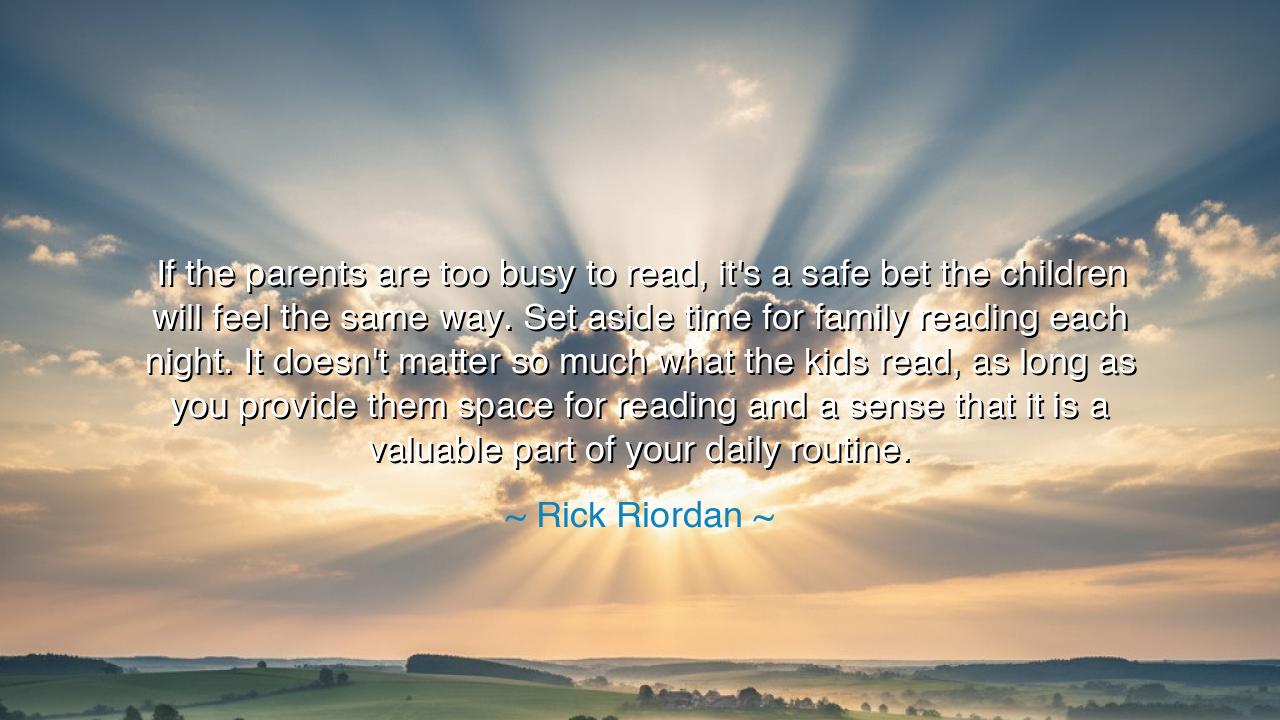
If the parents are too busy to read, it's a safe bet the children
If the parents are too busy to read, it's a safe bet the children will feel the same way. Set aside time for family reading each night. It doesn't matter so much what the kids read, as long as you provide them space for reading and a sense that it is a valuable part of your daily routine.






In the hustle and bustle of our modern world, where time slips through our fingers like sand, there is a truth that many have forgotten: the sacredness of reading and its power to shape young minds. As Rick Riordan wisely said, “If the parents are too busy to read, it’s a safe bet the children will feel the same way. Set aside time for family reading each night. It doesn’t matter so much what the kids read, as long as you provide them space for reading and a sense that it is a valuable part of your daily routine.” These words speak to the timeless importance of reading, not just as a tool for learning, but as a ritual that binds the family together, imbuing the daily life with meaning and connection.
In the ancient world, when the written word was still rare and sacred, the act of reading and storytelling was a communal ritual, passed down through the ages. The great Greek philosophers, from Socrates to Plato, understood the importance of story as a means to shape the soul. They spoke not of books alone, but of the power of oral storytelling—the passing down of knowledge, virtue, and wisdom through the act of listening and sharing. Stories were the very lifeblood of culture, and families would gather around the hearth to listen, learn, and share their lives through words. The great epic poems, like Homer's Iliad and Odyssey, were not simply tales of warriors and gods; they were reflections of life itself, lessons wrapped in narrative, teaching both the individual and the community what it meant to be human.
It is in this ancient tradition of shared storytelling that Riordan’s words take root. In a world where the pace of life leaves little room for connection, where screens often replace the turn of a page, the ritual of reading together as a family becomes even more important. Just as the ancients gathered to pass on their wisdom, so too must modern families carve out time each day to read together. It is not the material that matters most, but the space it creates—space for conversation, reflection, and, above all, connection. When a parent sets aside time to read to their child, they are not just reading words—they are sharing a moment, instilling in their children the importance of stories, of knowledge, and of understanding the world around them.
Consider the ancient Sumerians, who wrote some of the earliest stories, like the Epic of Gilgamesh, not only as a record of history but as a lesson for the soul. The kings and scholars of Mesopotamia understood that literacy was not merely about reading, but about teaching the young to grasp the threads of life that connected them to their ancestors and to the gods. The great flood in the Epic of Gilgamesh teaches about the fragility of life, the importance of friendship, and the eternal search for meaning. This wisdom was not taught in classrooms but shared in the evenings, around fires, and in the quiet moments of the day. This ancient practice of family storytelling mirrors what Riordan calls for—a dedicated time to read and connect, to pass on the wisdom of our time in ways that will last through generations.
When parents are too busy to read, they fail not just in providing knowledge but in passing on the most important lesson of all: the value of time spent together, of moments that can never be recovered. If a child grows up without this sacred ritual, without the example of their parents showing them the joy and value of reading, how can they come to understand that books are not just for school, but for life itself? The great educators of the past, like Confucius, emphasized the need to pass on not just knowledge, but character, and there is no better way to build character than through the shared practice of learning.
Let us look to the life of Abraham Lincoln, who grew up in a log cabin, surrounded by hardship. Despite his lack of formal education, Lincoln’s parents valued books and reading, and Lincoln himself read everything he could get his hands on, from the Bible to Shakespeare. His love for learning formed the foundation of his wisdom and the strength of his character. Lincoln understood that the written word had the power to shape a person’s soul, to inspire them to become something greater than themselves. In his own life, books were not just tools for knowledge; they were the gateway to his future, and through reading, he became a man of vision and purpose.
Thus, the lesson for us is clear: We must create the time and space for reading in our own lives. We must prioritize not just the physical act of reading, but the deeper purpose it serves in building strong, connected families. Riordan’s words remind us that it does not matter so much what the children read, but that they read—together, with purpose, with joy. Let us dedicate a portion of our day to this sacred ritual, passing on the stories that have shaped us, so that the next generation may find their own paths to wisdom, just as the ancients did. In that time of reading, we do not just educate, we build community, strengthen bonds, and create a world where stories are not just told, but lived.






AAdministratorAdministrator
Welcome, honored guests. Please leave a comment, we will respond soon